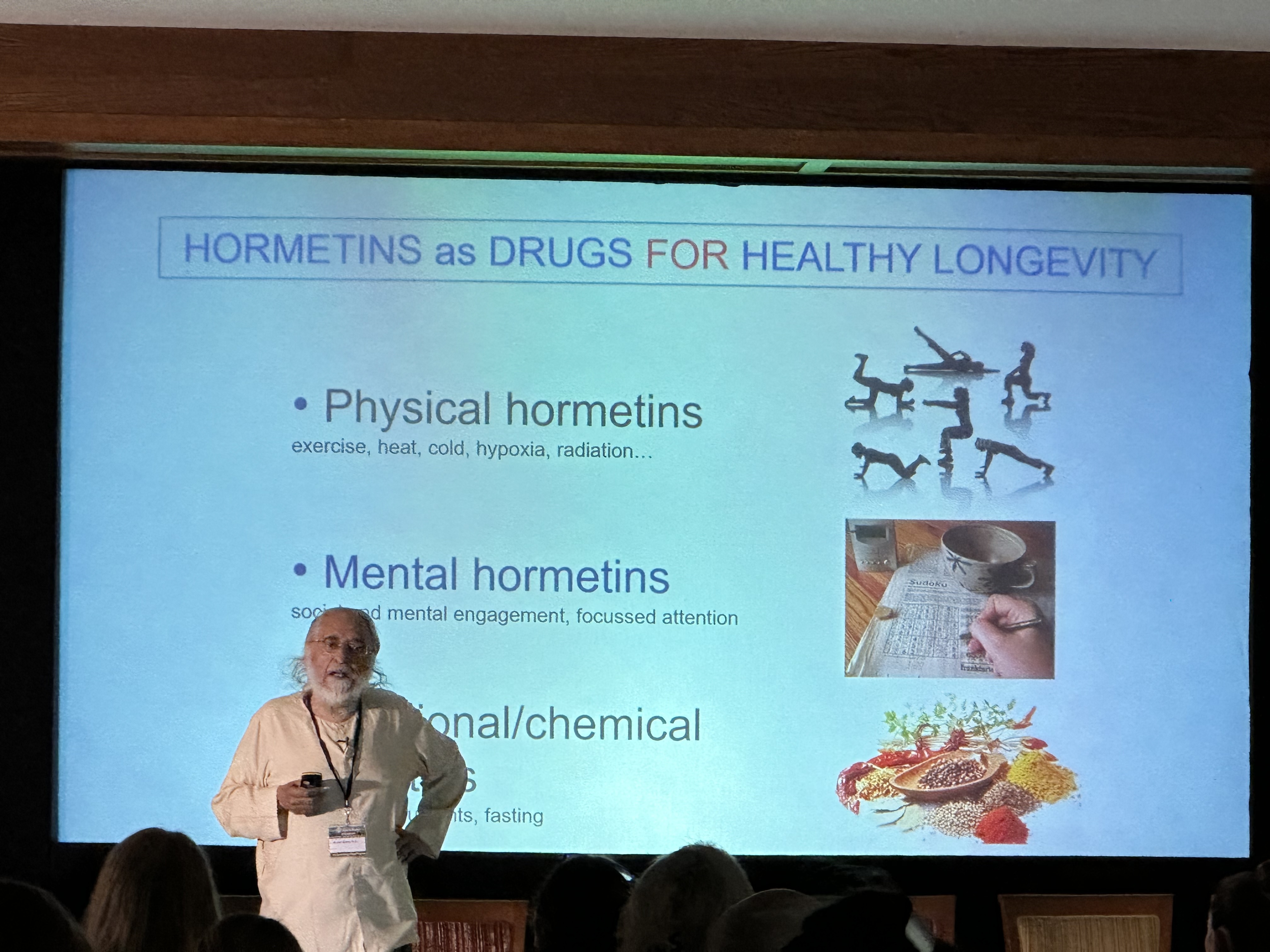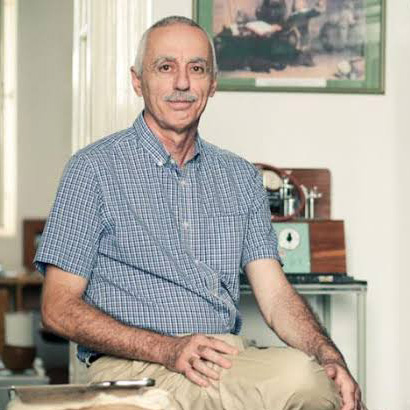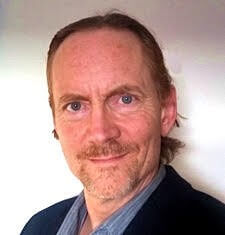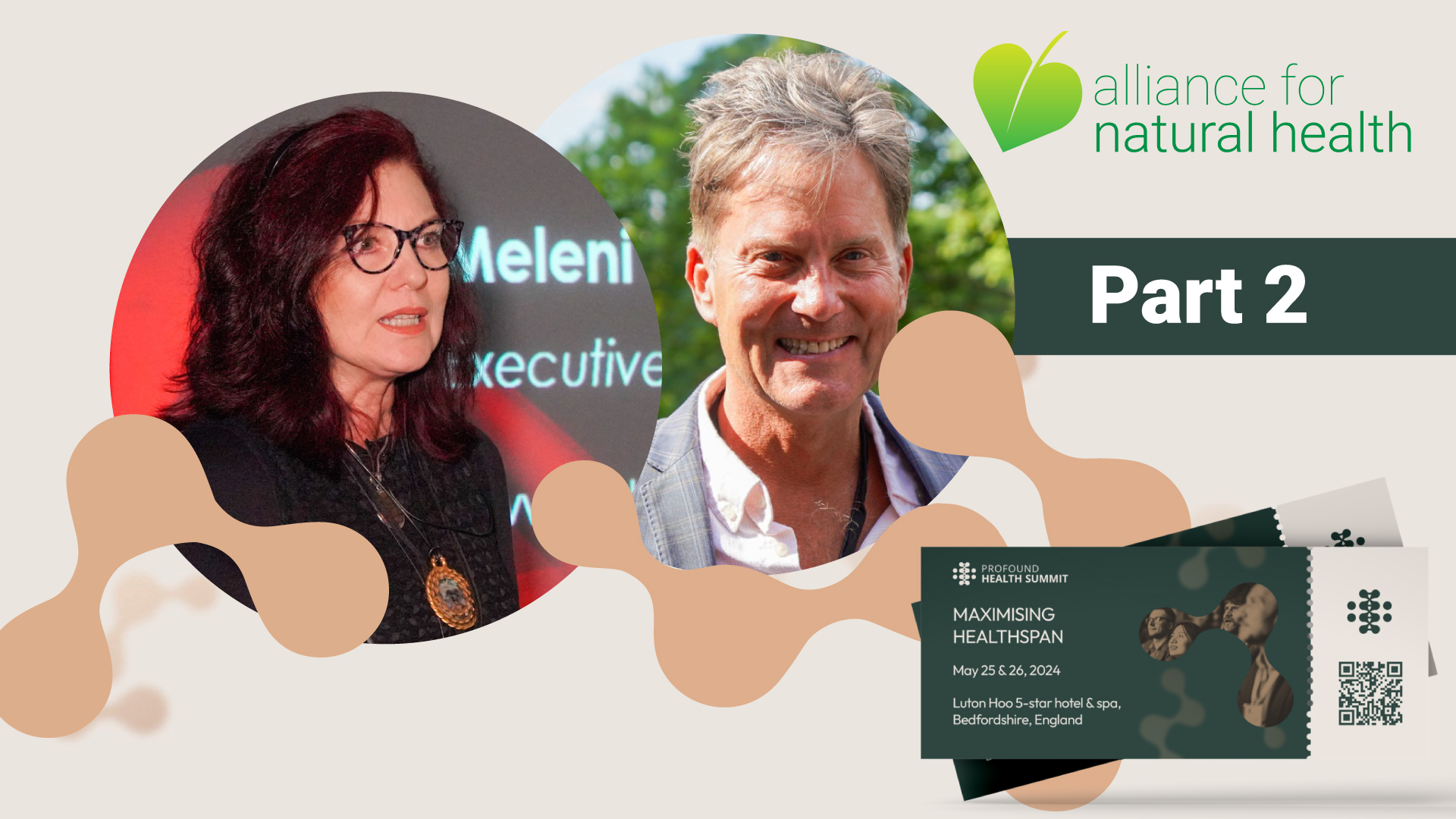Content Sections
By Rob Verkerk PhD
Executive and scientific director, ANH International and ANH USA
Listen to the article
Read the article
In Part 1 from this year’s Profound Health Summit published two weeks ago, I gave you ground-breaking information from some of the speakers. These included: Dr Bill Cham on the devil’s apple extract that cures common skin cancers; Dr Wendy Denning’s insights as a TV and practising family doctor on Bioidentical Hormone Replacement for menopausal women (and others); Dr Bill Lawrence and his remarkable clinical findings using natural short peptides from bovine (beef) and porcine (pork) sources, and Hannah Went who talked about the incredible third generation epigenetic testing by her company TruDiagnostics that allows accurate assessment of biological age, rate of biological aging and risk of various chronic diseases. Not to mention my own presentation on the extreme value of micronutrients that have been sadly relegated to the class of “non-essentials”.
This week, some gems from another clutch of speakers, and in the final part—all others—none other than my colleague Meleni Aldridge who gave a fantastic and insightful presentation on brain inflammation (= brain inflammageing)
Hormetins that extend life and healthspan
Suresh Rattan PhD DSc, Professor Emeritus at Aarhus University, Denmark shook up the audience with his refreshing and dignified approach to the science and medicine of human ageing. Instead of looking at ageing as something that needed to be combatted—as in “anti-ageing”—he saw it as something that should be nurtured and supported. This requires embracing its complexity and the natural changes and processes involved from senescence to telomere shortening, through to facilitating inter-connected networks and moving away from “one-target-at-a-time” interventions that have been shown to have limited success.
I was also thrilled to hear Prof Rattan major on the importance of hormesis – a phenomenon that is increasingly recognised as a key determinant of lifespan and healthspan. It explains a two-phase dose-response to various stimuli, in other words how small or low dose exposures to compounds or stressors that have the capacity to harm or even kill us at greater levels of exposure, help us to build tolerance to them and other factors—to become more resilient. And resilience gives us a clear survival advantage.
He showed these stress responses can mediate through a range of different mechanisms or responses related to antioxidants, DNA repair, autophagy, sirtuins, heat shock, unfolded proteins and the inflammatory response. This can apply to potentially toxic compounds in our food like polyphenols in fruits, to physical activity through to heat or cold exposure (hence the benefit of hyperthermia e.g. infra-red saunas and ice baths, Wim Hof style). But too much or too frequent exposure to stressors, rather than helping the body to find balance and resilience (physiological hormesis) does the precise opposite and moves us in the direction of collapse or failure of different systems (homeodynamic failure).
Usefully, Professor Ratta divided these life-enhancing hormetins into three categories:
- Physical hormetins e.g. exercise, heat, cold, radiation
- Mental hormetins e.g. social and mental engagement, focused attention
- Nutritional /chemical hormetins e.g. nutrients, plant secondary compounds, fasting

Prof Suresh Rattan presenting at the Profound Health Summit 2024
The sTORy of mTOR
Dr Marios Kyriazis, founder of the British Longevity Society and practicing anti-ageing physician, relayed the story of the nutrient-sensing pathway, mTOR (mammalian or mechanistic target of rapamycin). It’s a crucial cellular pathway that plays a major role in regulating growth, metabolism, and ageing. Because of this, it’s become a key target not only for interventions used by anti-ageing practitioners but also by an increasing number of biotech companies looking for new opportunities. After all, who doesn’t want to live a longer, healthier life?
Among the many things mTOR does is to regulate cell growth and proliferation, autophagy (clearance of defunct and dead cells and associated debris from the body), metabolism (balancing anabolic [building] and catabolic [breaking down] processes), protein synthesis and modulated immune function. However upregulating mTOR creates a bundle of not so pleasant things, including the excessive production of proteins, including misfolded proteins, that result in a build up of misfolded and damaged proteins that increase risk of disease and the rate of ageing.
Dysregulated mTOR signalling has been associated with some key diseases, including cancer (yes, there is a very large and growing literature on this), cardiovascular disease and neurodegenerative disorders. While much of the mechanistic work on mTOR was done on such animals as nematodes and fruit flies, there has been increasing application of learnings of the importance of modulating mTOR to clinical practice. The resurgence of interest in caloric restriction (CR) and intermittent fasting, as related to the metabolic theory and a renewed understanding of the importance of the Warburg effect and dysregulated mitochondrial function in cancer, has been inspired by a deepening understanding of mTOR signalling.
For example, mTOR inhibition mimics CR that has been thoroughly demonstrated to extend longevity in animals. The popularity of the drug metformin within the anti-ageing community is also driven by an understanding of its role in modulating mTOR.

Dr Marios Kyriazis MD Mac (Gerontology), medical advisor to the British Longevity Society and practicing regenerative medicine physician
Patient zero: The first human gene therapy guinea pig
Yes, we met the very first person to have been genetically altered by gene therapy! While we, among the gathered audience at the Profound Health Summit, listened intently to Liz Parrish’s remarkable journey, I subsequently discovered in the proceeding coffee break it was one that few in the audience were interested in taking. However, for those with genetic disorders, it might be an entirely different story.
In 2015, Ms Parrish, CEO of BioViva, publicly announced that she had undergone experimental gene therapy using products produced by her own company to address biological ageing, using two experimental treatments. One was designed to increase muscle mass by targeting the follistatin gene, and the other aimed to lengthen telomeres, which are protective caps on the ends of chromosomes associated with cellular ageing.
Liz Parrish speaking at RAADfest 2023, Garden Grove, CA
Alzheimer’s: genes are not your destiny
Some people go rapidly into Alzheimer’s disease (AD) and die prematurely, often from stroke or vascular dementia. For others, the majority, the progression is much slower and easier to manage. There is overwhelming evidence now that there is one genetic variation, the APOE-ε4 epsilon (pronounced ah-poh-ee-epsilon-4) variant that is strongly associated with the most rapid decline in late-onset AD.
Brian Delaney PhD, president of the Age Reversal Network, and cofounder of Vitality in Aging (VIA) Research Group, an initiative spearheading research into very near-term solutions to the problem of ageing, is a fan of extreme self-quantification and even transhumanism. He discovered he had the epsilon variant and rather than accepting the seeming inevitability of rapid AD decline in his latter years, Brian offered us, in his slide-free presentation, a somewhat emotional perspective on his approach, which could be likened to throwing the kitchen sink at his genetic profile.
The menu? Everything from gene therapy to CR, intermittent and long fasting, to metformin and other repurposed drugs to hyperbaric oxygen, to hyper- and hypo-thermia (heat and cold respectively)—not forgetting NAD precursor supplements like nicotinamide mononucleotide (NMN), that the US FDA wants to ban, and the closely related riboside form nicotinamide riboside, sold as NiagenTM, that has clearance from regulators both in the US and EU.

Brian Delaney—throwing the 'kitchen sink' at his less-than-ideal genetic variation
Stay tuned, and there’ll be more to come in Part 3 from the Profound Health Summit.
>>> If you’re not already signed up for the ANH International weekly newsletter, sign up for free now using the SUBSCRIBE button at the top of our website – or better still – become a Pathfinder member and join the ANH-Intl tribe to enjoy benefits unique to our members.
>> Feel free to republish - just follow our Alliance for Natural Health International Re-publishing Guidelines
>>> Return to ANH International homepage








Comments
your voice counts
There are currently no comments on this post.
Your voice counts
We welcome your comments and are very interested in your point of view, but we ask that you keep them relevant to the article, that they be civil and without commercial links. All comments are moderated prior to being published. We reserve the right to edit or not publish comments that we consider abusive or offensive.
There is extra content here from a third party provider. You will be unable to see this content unless you agree to allow Content Cookies. Cookie Preferences